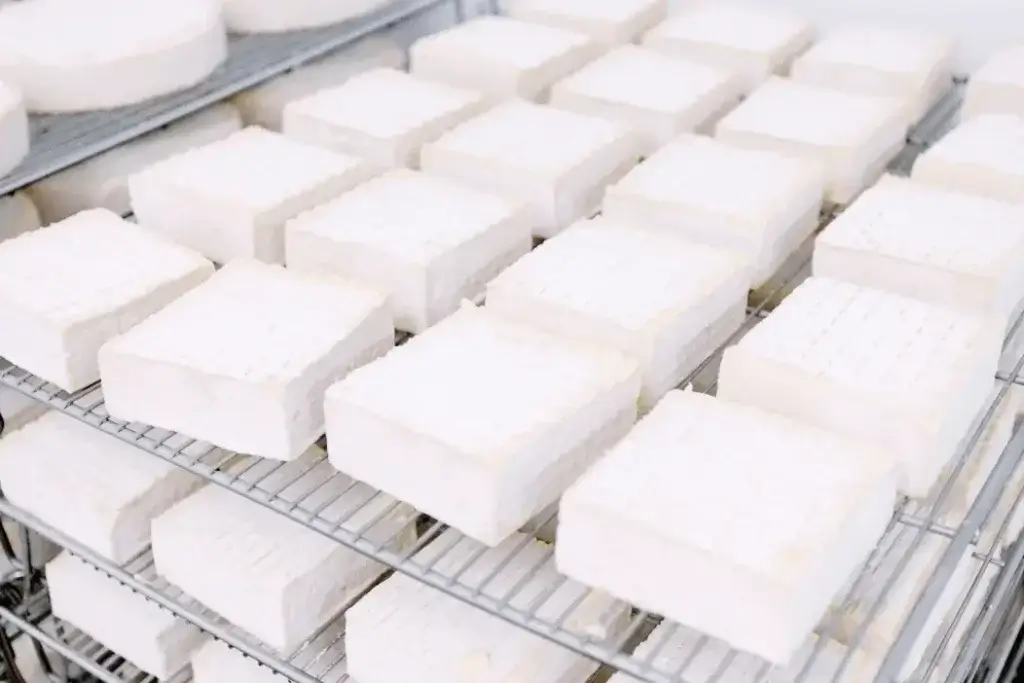If you don’t use feta regularly, it’s easy to waste the product because it’s typically supplied in huge quantities, either as a block or already crumbled. In addition, the cost of this white cheese may add up quickly when purchased in individual pieces. For this reason, it is necessary to provide a solution to the question, “Can feta cheese be frozen?”
One of the most well-liked kinds of soft cheese, feta is characterized by a briny flavor and a crumbly texture. It is common in the Mediterranean and may be found in dishes such as Greek salad. Its production often involves the use of sheep or goat’s milk.
If you have ever bought feta cheese but have been concerned about completing it before it goes bad, the question “Can I freeze feta cheese?” has undoubtedly crossed your mind. Simply put, the answer is yes, and it’s not hard to do!
Discover how to freeze feta cheese and divide out your feta so that you can save money by purchasing larger quantities and avoid having any of it go to waste. You can also save money by purchasing larger quantities.
Table of Contents
Can You Freeze Feta Cheese?

Many cheese varieties freeze well, but not all of them do. Some cheeses, like brie, are best suited for being cooked or baked into a meal rather than eaten on their own since they don’t taste as good. When it comes to freezing cheeses, feta is not the most delicate cheese to freeze, but it is certainly not the worst cheese to freeze.
As I’ve said before, freezing causes the feta to undergo various changes. After being defrosted, the feta tends to become more crumbly and might occasionally lose some of its salty flavors. The first scenario is problematic, while the second may be either, depending on your preferences.
Some folks enjoy less-salty feta better. And if you want to bring back that flavor, you may make feta brine and soak the cheese in it for a couple of hours to bring out the flavor that was there before.
When it comes down to it, as long as the meal you’re cooking isn’t ruined by the change in texture, utilizing frozen feta that has been thawed should work out just fine.
That indicates that it should perform well in all the cooked meals, but maybe not in all the salads. Before you serve it to your guests, you should try out your favorite salad dish with the feta once it has been allowed to defrost.
How Long Does Feta Cheese Stay Good Once It’s Opened?
A sell-by date is printed on the packaging of feta, just like it is on the packaging of almost all dairy products. It’s also a reasonable estimate of how long the cheese will keep its peak quality beyond that date. Unopened packages can usually be safely stored over the indicated use-by date for a week or more.
Whether or not the feta cheese was stored in brine will determine how the cheese should be handled after it was opened and any leftovers that may have been left over.
Feta stored in brine may maintain its high quality for up to four weeks after it has been opened. And just in case you were unaware, you can prepare your brine for feta cheese at home. The shelf life of brine-free leftovers is up to a week.
Because of this, you may safely keep unwrapped feta in brine for an extended period before it spoils. You certainly have the right to go ahead and freeze it, but you should be aware that the procedure will change the fetus somehow. Let’s have a conversation about it.
What Happens to Feta Cheese When It Gets Frozen?
The shelf life of feta cheese may be significantly extended by using the freezer. However, this hurts the cheese’s flavor as well as its consistency. Even while the shift might not be all that significant, the fact that it occurred is enough to throw you off.
Texture:
The texture of feta cheese tends to shift once it has been thawed out. You may discover it to be somewhat fragile. If you were initially expecting a more brittle consistency, likely, you wouldn’t notice this as immediately. On the other hand, this approach might not be the best choice for you if you’re looking for something a little bit more put together.
When you buy feta cheese, it will arrive in brine. This brine helps maintain the cheese’s creamy and velvety texture while keeping it wet. If you freeze it, the brine will evaporate, and whatever is left of it will crystallize, rendering it useless as a protective agent for the cheese.
As a consequence of this, it tends to become crumbly. The draining and freezing phase in the freezing process removes any further moisture that may have been present in the cheese before this step.
Taste:
Alterations in flavor and aroma are also brought about in feta cheese due to freezing it. The taste of feta is described as being both acidic and delicious. Additionally, it is creamy, making it an excellent partner for leafy green salads such as Caesar salads.
When feta is frozen, however, its characteristic tangy touch tends to disappear. During the process of freezing and subsequently thawing, some degree of intensity loss occurs along the route. It won’t have the same flavor, and it won’t have the distinctive snap that makes it so well-known.
How to Freeze Blocks of Feta Cheese?

You will need to begin by preparing the cheese blocks as the first step on your to-do list. The cheese, known as feta, is typically sold in a liquid that keeps it fresh, smooth, and soft. However, you won’t need it once it’s been frozen, so don’t worry about keeping it.
As a result, the brine should be drained from the container, and the block of cheese should then be dried. You may accomplish this by using a cloth to pat it dry gently. As a result, you will need to make sure that you use a material with a high absorption capacity.
Remember that some of the water will be left behind; thus, try to avoid squeezing out all of the liquid to the point where you wind up tearing the cheese apart. After that, cut the cheese into smaller blocks, each equal in size to the amount you anticipate using for one serving.
Because of this, you will only have to defrost the required amount rather than the whole batch. It is helpful to know what you want to do with the cheese in advance so that you can cut it into the appropriate-sized blocks before you start.
The individual blocks should then be sealed in a ziplock bag after being individually wrapped in cling wrap to prevent air from escaping. After that, you are free to put the bags in the freezer. It is beneficial to label the various packages with the date they were packed and the date they should be sold.
How Should Crumbled Feta Be Stored in the Freezer?

You may also freeze feta cheese that has been crushed. First, spread the crumbled cheese out on a baking sheet. Spread it out and make sure the coating is level. Please ensure the baking sheet is covered with either aluminum foil or a silicone mat before you put anything on it.
It is essential to ensure that the crumbs are split and kept apart. This is the proper method for dividing up the breaded cheese. Make sure that each portion has the exact quantity that you anticipate being required for each meal.
The crumbs should then be placed in the freezer, and once they have frozen, they should be transferred into an airtight container or several separate ziplock bags. After that, you may place them back inside the freezer.
What you Need to Know about Storing Feta Cheese in the Freezer?
Even while it is safe to freeze feta cheese, there are a few things you should be aware of to ensure you don’t eat feta that has gone bad. This requires you to understand how to properly thaw your cheese when ready to consume it and properly store it in the freezer.
In addition, it is of the utmost importance to be aware of when it is appropriate to discard your feta. It makes no difference whether cheese is kept in the refrigerator or the freezer; it has a shelf life. For this reason, it is essential to write the dates on the freezer bags before putting them away. After purchasing frozen feta, you should consume it within three months.
The Telltale Signs That Your Feta Cheese Has Turned Bad:
If the feta cheese has developed a rancid odor, it hasn’t gone well. To insult injury, you should get rid of it if it has mold growing on it and has changed color. While mold spores on many varieties of cheese are entirely acceptable, mold on feta cheese is unacceptable and a warning that the cheese has gone bad.
Instructions for Defrosting Frozen Feta Cheese:
You are not recommended to bring your frozen feta cheese to room temperature to defrost it. It’s possible that doing so will cause contamination.
When ready to use your cheese, remove it from the freezer and store it in the refrigerator until you are prepared to use it. Do not remove the cheese from the plastic wrap since doing so will cause the cheese to get dry. Let it sit out at room temperature for a few hours to thaw.
After taking the cheese out of the plastic, you should try it yourself. Unfortunately, freezing feta cheese may cause some of the cheese’s qualities to diminish, but there is a simple solution to this problem.
Put the cheese in a jar with some brine made of salt water and olive oil or some brine made of salt water and olive oil. This will give the cheese some additional taste. Just forget about it for the next several hours.
How Should I use Feta Cheese once It has been Thawed?

The following are some of the many applications for both frozen and thawed feta:
- Foods that need cooking and baking, such as casseroles, stews, pizzas, and frittatas.
- Melting feta over spaghetti in a pan. I didn’t realize how nicely feta goes with spaghetti until I had a dish with both ingredients at a friend’s house.
- Sauces. A wide variety of rich sauces call for feta, and thawed feta should perform admirably in all of those sauces.
- Salads, even though they might be risky. After allowing the dairy product to defrost, strain out any excess water and begin the process with a tiny quantity as a trial run.
Frequently Asked Questions:
Should feta cheese be kept in the refrigerator or at room temperature?
If the box is left unopened, feta cheese may be stored at room temperature for approximately one week before it has to be refrigerated.
How long can feta cheese be left out before it goes wrong?
It is safe to keep feta cheese at room temperature for about two hours after taking it out of the refrigerator. After this, you are going to be walking on fragile ice.
Bottom Line:
Feta cheese can be frozen. Be careful to firmly wrap it in plastic wrap or store it in a container that can be frozen before placing it in the freezer. The shelf life of feta cheese that has been frozen is around one to two months. When ready to utilize the cheese, let it thaw in the refrigerator for at least one whole night before proceeding.







